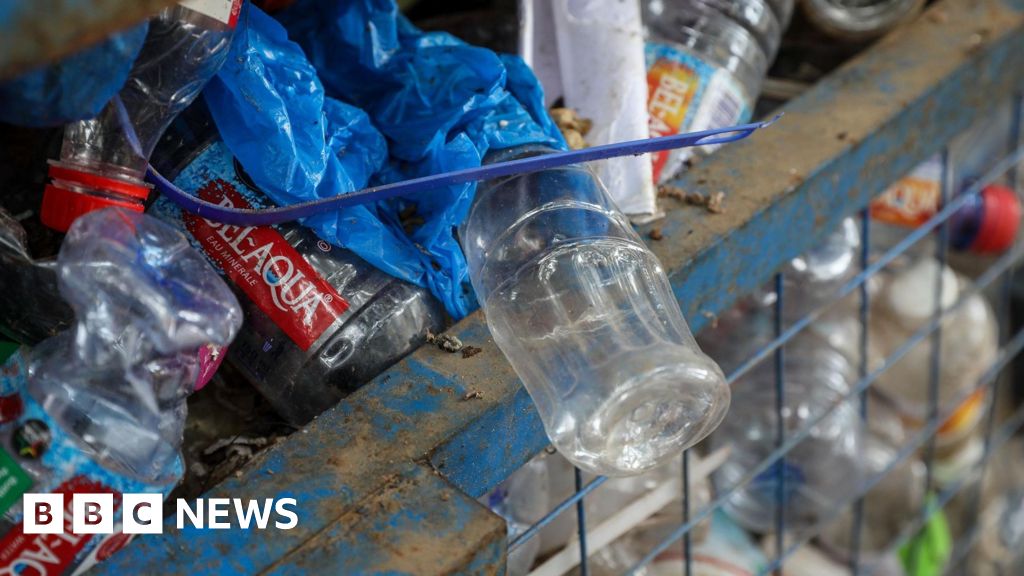
Can countries solve the plastic pollution problem?
AI-Generated Summary
The article, "Can countries solve the plastic pollution problem?", delves into the escalating global plastic crisis, highlighting the immense scale of pollution and the stalled international efforts to address it. Scientists estimate that nearly 200 trillion pieces of plastic currently float in the world's oceans, a figure projected to triple if no decisive action is taken. Despite a 2022 agreement among nations to develop a legally binding global treaty to curb plastic waste and harmful chemicals, two years of negotiations have yielded no consensus, leading to a critical UN conference in Geneva.
Plastic, initially hailed as a "miracle product" due to its versatility, strength, and heat-resistant properties, has become ubiquitous since the explosion of synthetic plastics made from fossil fuels in the 20th century. However, its rapid proliferation occurred "without understanding its full impact," as noted by Dr. Alice Horton of the National Oceanography Centre. Production has grown exponentially, from two million tonnes in 1950 to 475 million tonnes in 2022. A significant portion, about 60%, is single-use, and a mere 10% is estimated to be recycled, largely due to the high cost and limited availability of recycling infrastructure.
The environmental impact is profound. Plastic accumulates in marine environments, posing severe threats to wildlife through ingestion and entanglement, leading to internal organ damage, digestion difficulties, and fatalities. Furthermore, plastic breaks down into microplastics, which have permeated every tested living system and geographical range, from deep seas to mountain tops. Dr. Horton warns that accumulation of microplastics in tissues can cause inflammation, cell damage, and hormonal changes, leading to long-term weakening, disease, and eventual death in organisms. Beyond wildlife, plastics are a "grave, growing and under-recognised danger" to human health. A Lancet Countdown report estimates that health-related disease and death from the "plastic crisis" cost at least $1.5 trillion (£1.1 trillion) annually. Impacts range from air pollution during production to elevated risks of cancer, respiratory illnesses, and miscarriages from plastic contamination within our bodies. The article highlights that plastics contain over 16,000 chemicals, many of which are toxic and carcinogenic, yet there's a significant lack of transparency, with only a quarter of plastic chemicals having data on their impact, and 75% of those tested found to be "highly hazardous."
The international community's struggle to forge a treaty is a central theme. The deadline for a global treaty, set for December 2024, passed without agreement after five rounds of negotiations. The current UN conference aims to bridge divides on key issues: targets on cutting single-use plastic production, bans on harmful chemicals, universal guidance on product design, and financing mechanisms. Rob Opsomer of the Ellen McArthur Foundation emphasizes that consistent design standards, like using clear rather than colored plastic for bottles, could significantly improve recycling efficiency and reduce demand for virgin plastics. A major point of contention lies between nearly 100 countries, including the UK, advocating for an "ambitious" treaty that includes limits on production levels, and a group of oil-producing nations like Russia and Saudi Arabia, who strongly oppose production caps, preferring to focus solely on increasing recycling. This opposition is rooted in economic concerns, as plastic represents a potential growth market for the oil industry as demand for fossil fuels in energy and transport systems is expected to peak. However, the lack of clear global regulations also imposes costs on businesses, who face brand reputation risks from littering and the burden of complying with hundreds of disparate national standards. The Business Coalition for a Global Plastics Treaty, which includes major plastic users like Nestle and Unilever, is even calling for coordinated taxes to fund recycling and cleanup efforts. The article concludes by suggesting individual actions to reduce plastic waste, such as using reusable containers, walking or cycling to reduce microplastic emissions from car tyres, and avoiding products like chewing gum and glitter that easily break down into microplastics.
Key Points
- Global Plastic Crisis: Nearly 200 trillion pieces of plastic are in the world's oceans, with projections indicating a potential tripling if no action is taken.
- Failed Treaty Negotiations: After two years and five rounds of talks, countries have failed to agree on a legally binding global treaty to address plastic waste and harmful chemicals.
- Severe Impacts: Plastic causes significant harm to marine wildlife through ingestion and entanglement, and poses a grave danger to human health, linked to cancers, respiratory illnesses, and an estimated $1.5 trillion annual health cost.
- Core Disagreement: Nations are divided between those advocating for limits on plastic production (e.g., UK) and oil-producing countries (e.g., Russia, Saudi Arabia) who prefer to focus solely on increasing recycling efforts.
Continue Reading the Full Article
You've read the first 100 words. There are 1155 more words to discover in the original article.
Support quality journalism by reading the full article on the publisher's website.